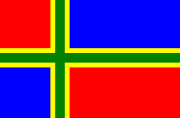Folkspraak facts for kids
Quick facts for kids Folkspraak |
|
|---|---|
 |
|
| Created by | Collaborative work |
| Date | 1995- |
| Setting and usage | International auxiliary language |
| Purpose |
constructed languages
|
| Sources | Vocabulary, phonology and grammar from Germanic languages |
Folkspraak is a special kind of language that people made up. It's not a natural language like English or Spanish. Its name means "the language of the people." People started creating Folkspraak in 1995.
The main idea behind Folkspraak was to make a language that is easy for people who already speak Germanic languages to understand. Germanic languages include English, German, Dutch, Swedish, and Norwegian. Folkspraak uses words and grammar that are similar to these languages.
Think of Folkspraak like a "bridge language" or a lingua franca. It helps people from different countries who speak Germanic languages talk to each other. It's still being worked on, so it's not completely finished yet.
Contents
What is a Constructed Language?
A constructed language is a language that someone creates on purpose. Natural languages, like English, grow and change over many years. But constructed languages are designed by people. They often have clear rules for grammar and vocabulary.
Why Create a Language?
People create languages for many reasons. Some are for books or movies, like Elvish from The Lord of the Rings. Others are made to help people from different countries communicate easily. These are called international auxiliary languages. Folkspraak is one of these.
Zonal Constructed Languages
Folkspraak is a "zonal" constructed language. This means it's made for people in a specific language "zone" or group. For Folkspraak, that zone is the group of people who speak Germanic languages. The goal is to make it simple for them to learn and use.
How Folkspraak Works
Folkspraak uses words that sound familiar to speakers of Germanic languages. For example, the word for "father" in Folkspraak is "Fader" or "Fader." This is very close to "Vater" in German, "fader" in Danish, and "father" in English. This makes it easier to guess what words mean.
Simple Grammar
The grammar rules in Folkspraak are also kept simple. This helps new learners pick up the language quickly. The creators wanted to avoid complex rules that might be hard to remember.
Different Versions of Folkspraak
Because many people have worked on Folkspraak, there are a few different versions. These versions might have slightly different spellings or ways of saying things. It's a bit like how different English-speaking countries have different accents or words.
For example, the famous "Lord's Prayer" has been translated into several Folkspraak versions. This shows how the language can be adapted. It also highlights the different ideas people had for the language.
The Goal of Folkspraak
The main goal of Folkspraak is to be a helpful tool for communication. It aims to make it easier for people who speak different Germanic languages to understand each other. It's a project built by many people working together.
See also
 In Spanish: Middelsprake para niños
In Spanish: Middelsprake para niños
 | William Lucy |
 | Charles Hayes |
 | Cleveland Robinson |

